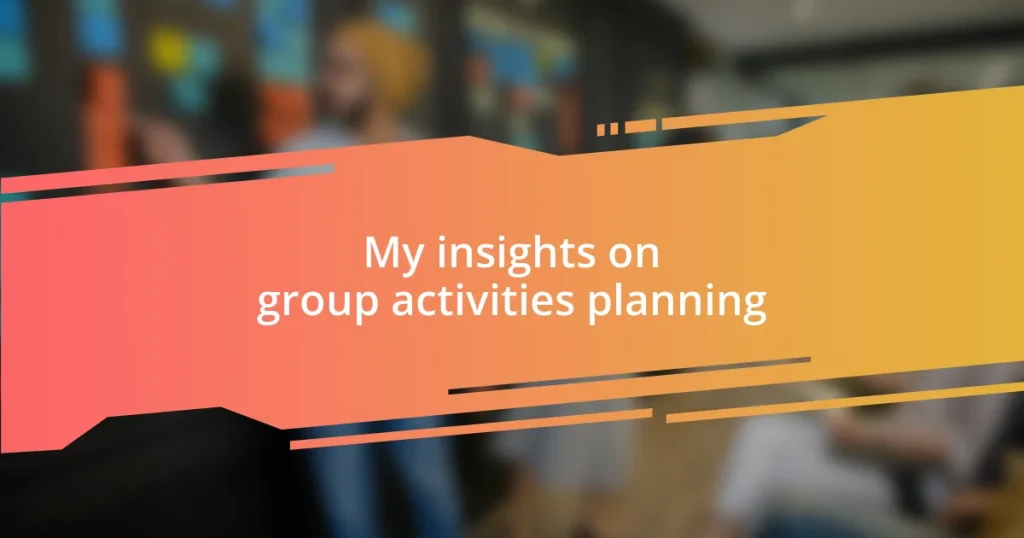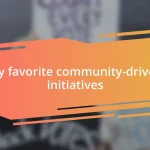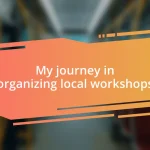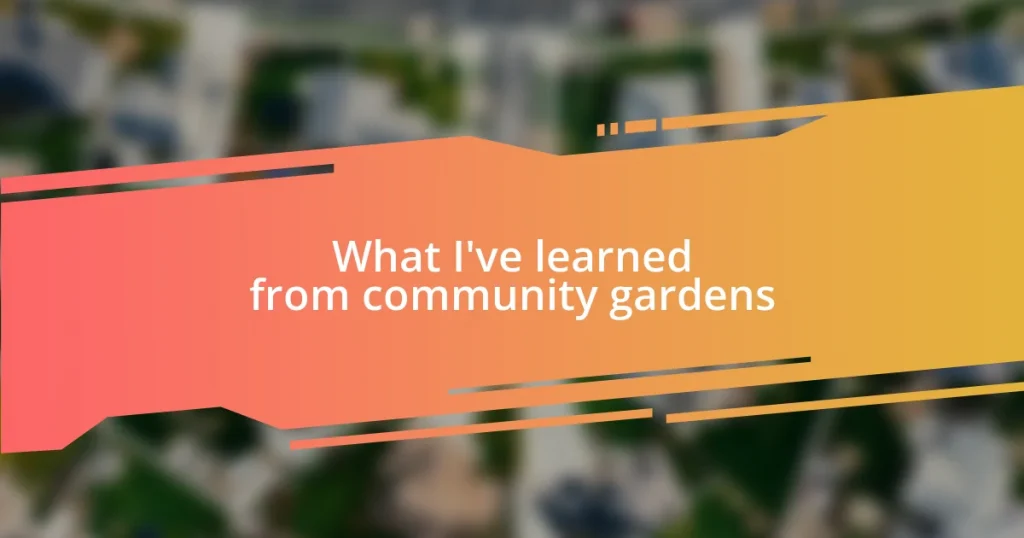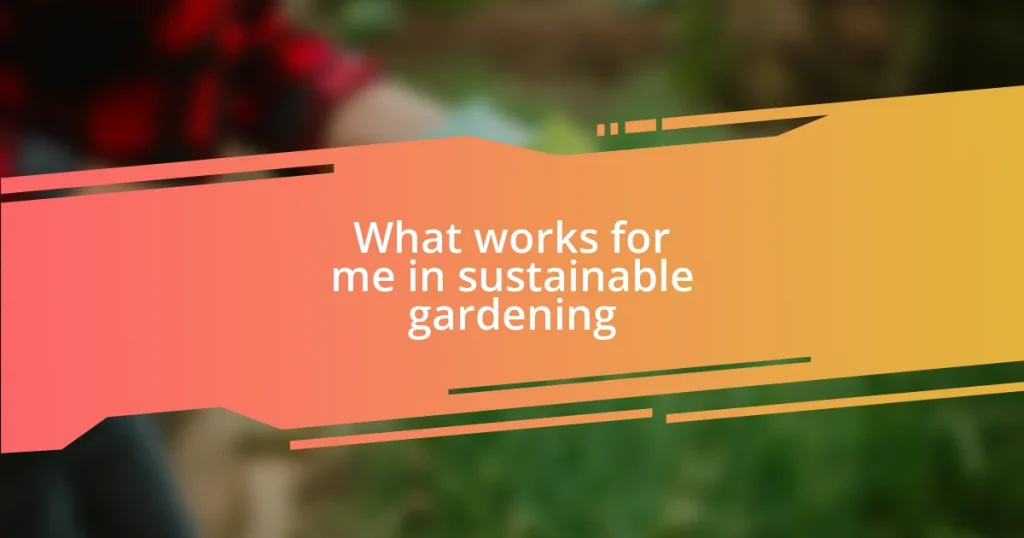Key takeaways:
- Effective planning involves clear communication, adaptability, and fostering participant engagement, which enhances overall experiences.
- Recognizing group dynamics and assigning clear roles cultivates collaboration and ownership, leading to smoother execution of events.
- Evaluating success requires a reflection on emotional connections and feedback, highlighting the importance of participants feeling valued and heard.
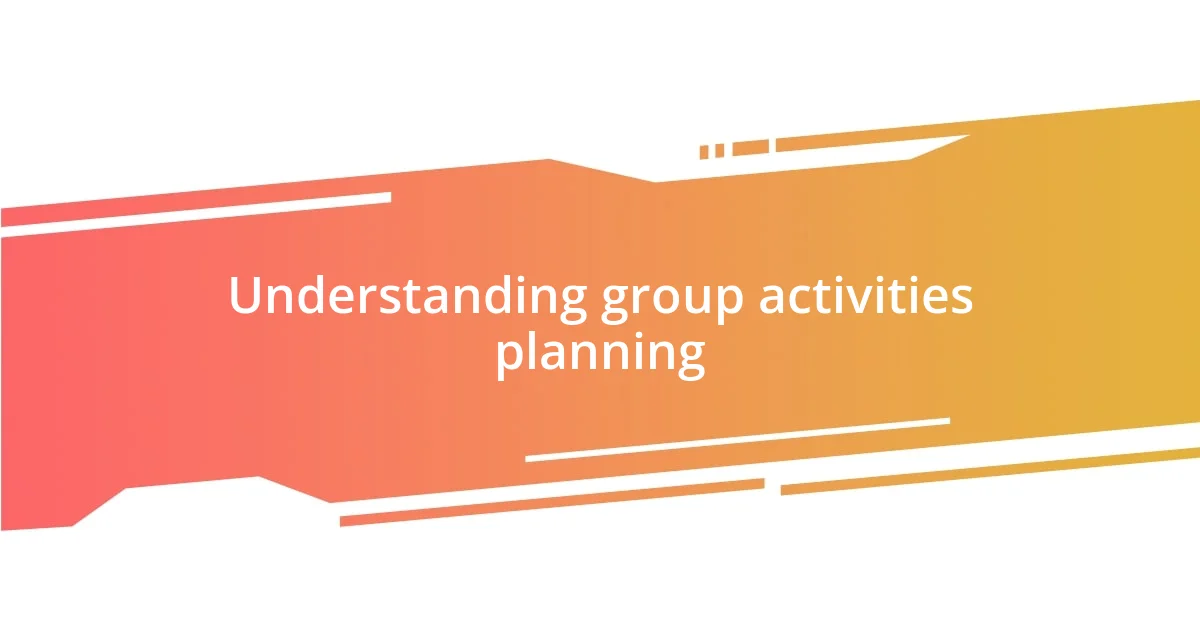
Understanding group activities planning
Understanding group activities planning involves more than just arranging dates and venues; it’s about fostering connections. I recall a time when I organized a team-building retreat. The energy in the room shifted when everyone felt included and valued in the planning process. Have you ever noticed how shared ownership can elevate participation and enthusiasm?
When planning activities, I’ve learned the importance of clear communication. It’s fascinating how a simple misunderstanding can derail even the best-laid plans. Once, I neglected to clarify roles for a community event, which led to confusion on the day of. How do you ensure everyone is on the same page to avoid that pitfall?
The emotional aspect of group activities planning often gets overlooked. The joy on participants’ faces during a well-executed event is a powerful reminder of why I love this work. Have you ever felt that rush when your group successfully connects and enjoys the experience? It’s that moment of empowerment that reinforces the value of thoughtful planning.
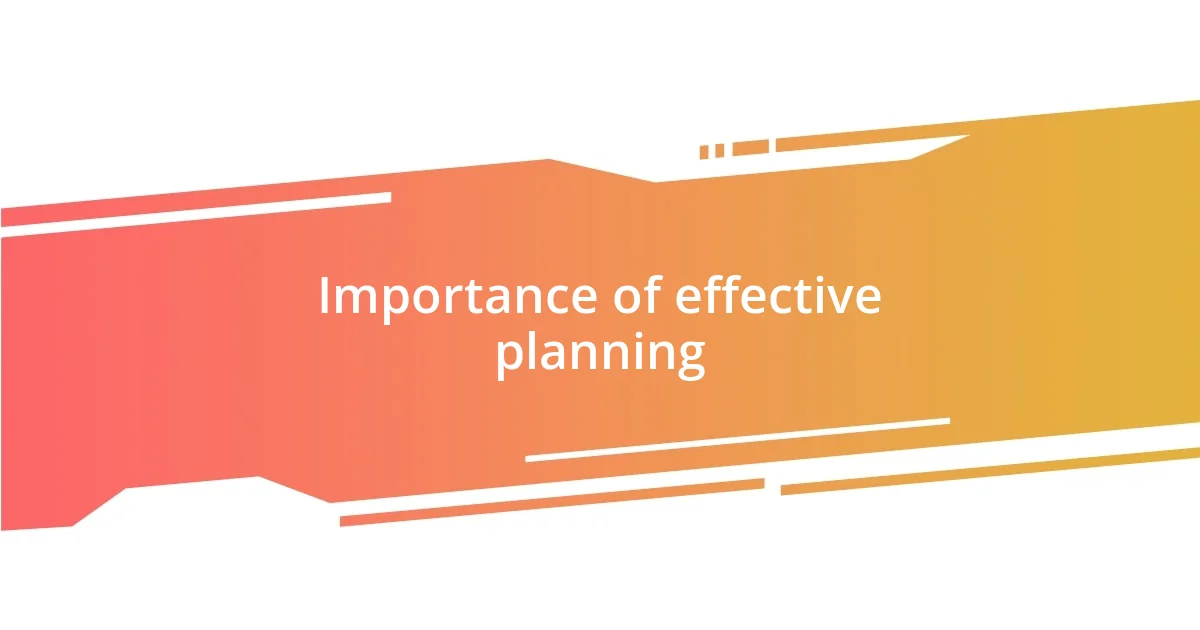
Importance of effective planning
Effective planning is crucial because it lays the groundwork for successful group activities. I remember a conflict that arose from not allocating enough time to prepare for a volunteer project. It was a mess! Chaos ensued because we didn’t identify potential challenges or set clear goals beforehand. Have you ever faced a similar situation where lack of foresight led to unnecessary stress?
Another aspect I value in effective planning is adaptability. During a recent picnic, the weather changed last minute. Because we had a backup plan in place, we smoothly transitioned to an indoor venue. That experience reminded me that a well-thought-out plan should not only look good on paper but must also prepare us for the unpredictable twists life throws our way. Isn’t it reassuring to know that with effective planning, we can handle surprises better?
Ultimately, effective planning cultivates engagement and ownership among participants. When individuals feel included in the planning stages, they’re more likely to take an active role during the event. Reflecting on my experiences, I can honestly say that the most memorable activities stemmed from collaborative efforts before the event. When have you seen the energy shift due to collective planning?
| Benefits of Effective Planning | Consequences of Poor Planning |
|---|---|
| Fosters collaboration and ownership | Can lead to confusion and frustration |
| Prepares for unforeseen challenges | May result in wasted time and resources |
| Enhances overall participant experience | Reduces engagement and enthusiasm |
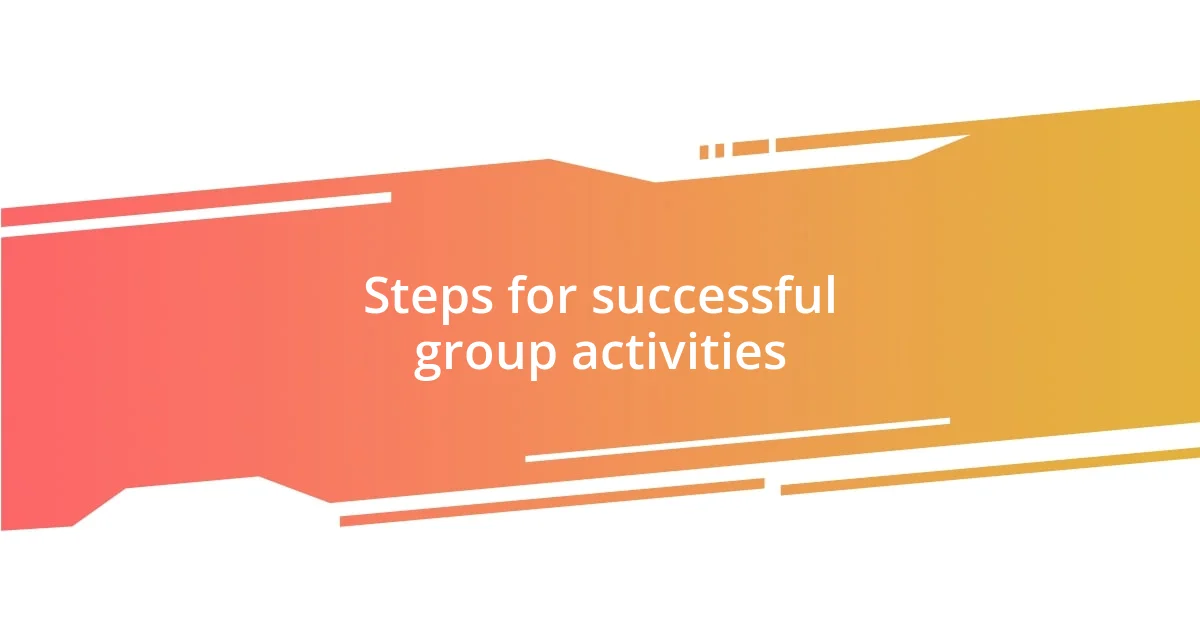
Steps for successful group activities
When it comes to successfully organizing group activities, I find that a step-by-step approach works wonders. My first tip is to identify your overall goal. I once planned a charity run without a clear purpose, which left participants confused about the event’s significance. Once I shifted my focus to raising awareness for a particular cause, enthusiasm soared. That clarity can make a world of difference.
- Define the purpose of the activity.
- Select a suitable date and location early on.
- Create a detailed timeline that incorporates deadlines.
- Delegate tasks to ensure shared responsibility.
- Communicate regularly with all participants to keep everyone in the loop.
Another critical step I’ve seen is fostering a collaborative atmosphere right from the start. I remember a workshop where we pooled ideas together during the planning phase, which not only streamlined the process but also sparked a wave of creativity. Participants’ excitement grew as they saw their voices valued, leading to a more dynamic event. Inclusive planning truly enhances the collective experience.
- Encourage input from all members.
- Use collaborative tools for planning tasks.
- Be flexible to incorporate suggestions.
- Build a supportive environment where everyone feels heard.
- Celebrate small milestones to maintain morale.
Having experienced these elements firsthand, I firmly believe they set the tone for a rewarding group activity.
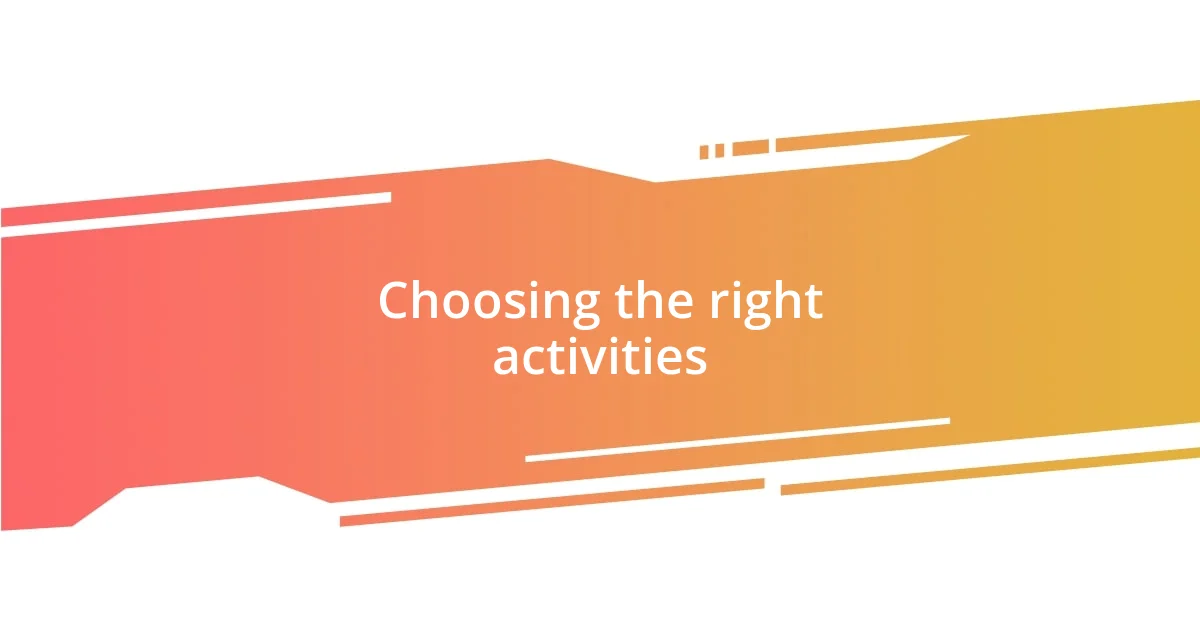
Choosing the right activities
Choosing the right activities starts with understanding your group’s interests and dynamics. I recall a team-building retreat where we thought a survival skills workshop would be engaging, only to find out half the group had no interest in outdoor activities. It taught me the importance of aligning activities with participants’ preferences. How often do we overlook what makes our group tick?
Additionally, I’ve learned that variety can significantly enhance group activities. In a recent planning session for a community fair, we included everything from crafts to cooking competitions. The excitement in the room was palpable as everyone suggested their favorites. Mixing things up caters to diverse tastes and keeps energy levels high. Have you ever noticed how a well-rounded agenda can transform an event’s atmosphere?
Sometimes, it’s also about pushing boundaries just enough. During a youth workshop, we introduced a karaoke session, which at first seemed risky. But seeing the participants let loose and bond over shared laughter was priceless! It reminded me that selecting the right activities isn’t just about comfort zones; it’s about creating unforgettable experiences. What are some activities you’ve tried that surprised you with their effectiveness?
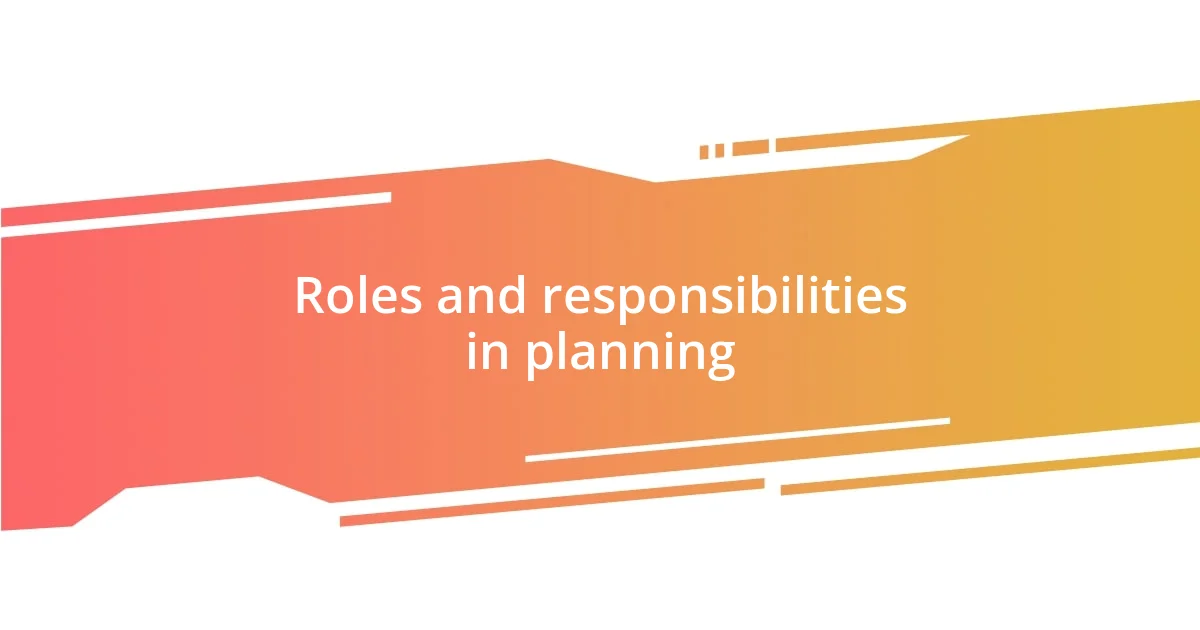
Roles and responsibilities in planning
In my experience, assigning clear roles within the planning team ensures a smooth process. For example, in organizing a community clean-up day, I took on the role of coordinator while a close friend managed communications. It was empowering to see how our specific responsibilities allowed us to focus and execute tasks effectively. Have you ever noticed that when everyone knows their role, things tend to flow more effortlessly?
Another key point is the importance of having a designated leader. I recall a workshop I ran where I stepped up as the main planner, and while it was daunting, it helped me streamline decisions and maintain momentum. A strong leader not only keeps the team motivated but also serves as the go-to person for any questions or concerns. Who doesn’t appreciate when someone confidently guides the way?
Lastly, I find that encouraging team members to take ownership also plays a vital role. In a recent event planning session, I noticed how a volunteer took charge of organizing refreshments, bringing in unique ideas that I wouldn’t have considered. This kind of initiative fosters a sense of pride and responsibility among team members. Wouldn’t you agree that when people feel invested, the outcome is often more successful and rewarding?
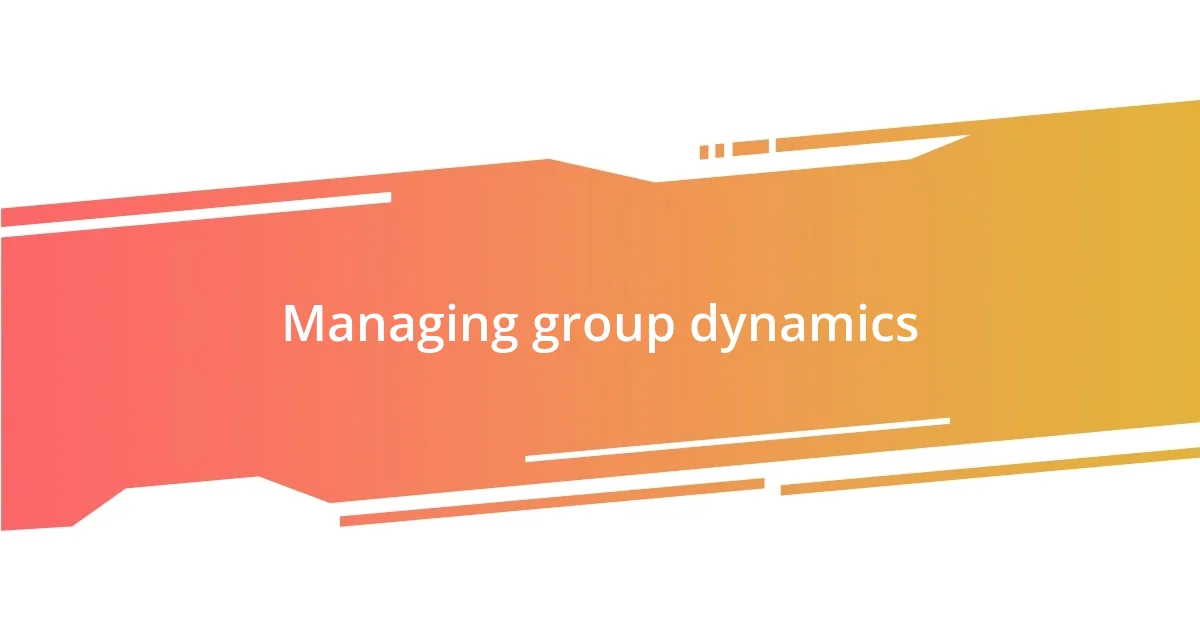
Managing group dynamics
Managing group dynamics is essential for successful activities, and I’ve learned that recognizing each individual’s strengths can significantly influence the group’s interaction. During a community seminar I facilitated, we divided attendees based on their expertise, which sparked lively discussions and collaboration. When participants see their value and feel recognized, their investment in the outcome tends to soar. Have you ever experienced a moment when someone’s perspective completely changed the conversation?
Another important aspect is addressing conflicts proactively. In a recent project, two strong personalities clashed over differing ideas. Instead of letting tension simmer, I initiated a roundtable discussion that allowed each to articulate their viewpoints. It was fascinating to witness how just giving them a platform to voice their concerns transformed the atmosphere from contentious to collaborative. Don’t you think creating a space for open dialogue is crucial in keeping the morale high?
Finally, fostering an inclusive environment can profoundly impact group dynamics. I remember a time when I organized a workshop that emphasized sharing personal stories. The vulnerability participants displayed created an unmistakable bond among them. By encouraging openness and acceptance, we cultivated trust, which turned out to be the foundation for a productive session. Wouldn’t you agree that when everyone feels safe to contribute, the outcomes can be far more innovative and meaningful?
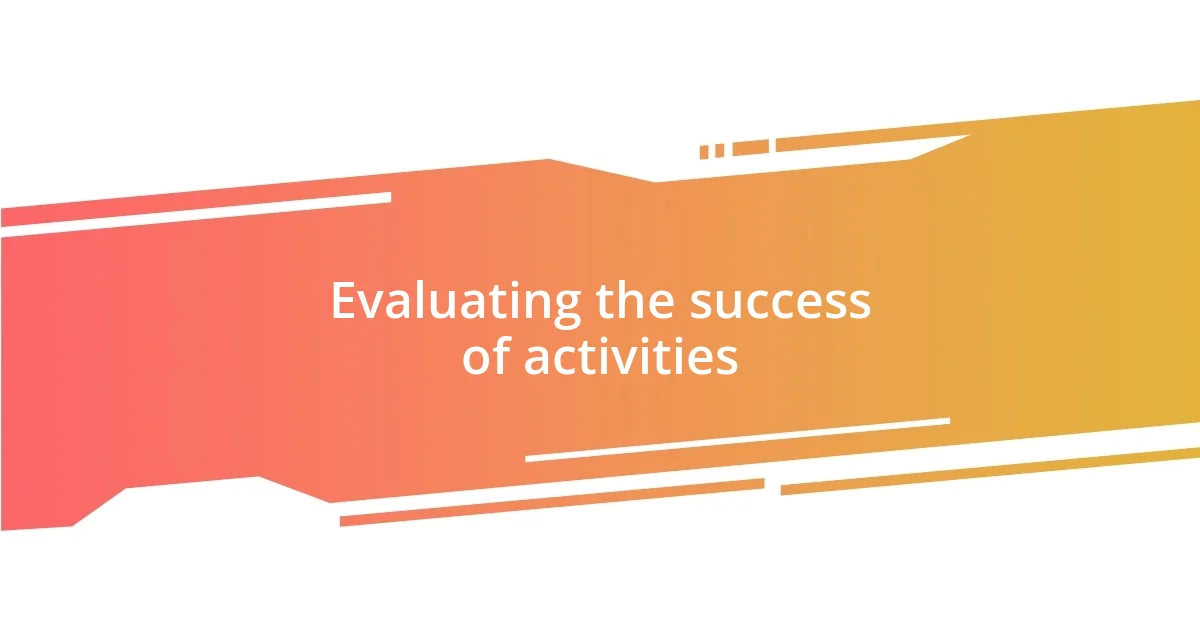
Evaluating the success of activities
Evaluating the success of activities often requires a multi-faceted approach. For instance, after a fundraising event I coordinated, I was truly fascinated by the data we collected. We analyzed participation rates, feedback forms, and the amount of money raised. Seeing numbers is one thing, but hearing heartfelt stories from attendees about why they supported our cause was equally telling. Isn’t it rewarding when data not only reflects success but also resonates emotionally?
Another aspect I’ve found crucial is the post-activity reflection session. Following a weekend retreat we organized, I gathered everyone for a candid discussion about their experiences. This gathering opened up a treasure trove of insights—some participants felt inspired, while others shared that they wished for more hands-on activities. These diverse opinions helped me realize that success isn’t just about meeting goals; it’s about ensuring everyone feels their voice mattered. Hasn’t everyone experienced that moment when feedback makes you rethink your approach?
Ultimately, I believe in measuring success through personal connections made during activities. I recall a team-building exercise where I facilitated interpersonal sharing in small groups. Seeing participants open up and bond over shared experiences touched my heart, and I knew right then that we had succeeded in weaving a supportive community. When we foster authentic connections, isn’t that a true marker of success?










